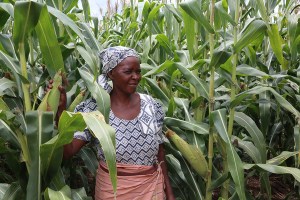WE, in the village, are not just content with ownership and control but value our spirituality and true identity — avo ndiChirandu, avoMhofu, avoNgara.
In the village there is no mistaking who we are and what we represent.
On all fronts — mining, agriculture and manufacturing — we are recording notable developments, setting us firmly on the growth trajectory.
It is time we also put more effort on the work to re-discover our spirituality.
Without establishing and practising our cultural and religious identity, we will not be able to defend our independence and sovereignty.
Our religion, if I am to call it that, is different from others; ours is not practised on a particular day nor does it have a uniform. Our religion is our way of life, practised every day we live.
Veteran gospel artiste Mai Olivia Charamba has called on Africa to “…restore your identity…” in one of her popular songs ‘Africa Restore Your Identity’.
These are profound words calling on us to believe in ourselves no matter what other people say.
And most importantly, Mai Charamba goes to the crux of the matter when she says: “Africa believe that, ‘…you are not poor but you are rich. You are rich, you are not poor’!”
And goes on to ask another important question: “Africans who are we going to believe?”
Are we going to believe those who say Africa is poor or that, in fact, Africa is rich?
Foreign religions and others cannot help us to believe in ourselves.
We must stand on our own.
The lack of self-belief, endemic among many Africans, including Zimbabweans, is a creation of the colonial process and is retarding our growth; in fact, it is the reason others pull in a different direction.
Through persuasion, bribery, including distributing sugar, trickery, brutal force and other ‘hook-or-crook’ strategies, tremendous damage was visited on the spiritual and cultural integrity of our people.
When the missionaries were invited to join the fray (the battle to subdue the spirit of the African), they received ‘wise’ counsel from King Leopold ll of Belgium. He asked the ‘men of God’ not to waste time teaching Africans about God because they already know him.
Instead, King Leopold ll urged the Christian missionaries, to teach Africans to hate their own culture, to look down upon their customs and religion.
And most importantly, for the interests of these looting invaders, Africans were to be taught to hate wealth and all the trappings of good living.
They were to be taught that the good Lord hated, and would condemn to hell, all those who were rich.
“Blessed are the poor,” so the teaching went!
Who does not want to be blessed?
The missionaries drummed into the hapless Africans that material poverty was the preferred state in which God accepted people into heaven.
And there is even a hymn to emphasise the point that happiness is in heaven, not on earth!
Despite the fact that Africans already had a thriving religion in which they believed in one God, Mwari, Musikavanhu, Umlimo, the Creator, missionaries made all efforts to discredit the God of the Africans, claiming their own was the one and only God. The ‘African God’ was portrayed as evil; the same brush also painted the spirit mediums (masvikiro) and ancestral spirits (vadzimu).
But in most religions, there are intermediaries between God and man.
In the Jewish religion, prophets (so many described in the Bible) were the intermediaries while Jesus and Mohamed were the prophets for Christianity and Islam respectively.
However, to conquer the spirit of the people and disconnect them from their own religion and reality, the missionaries went all out to demonise the African Traditional Religion and Mwari, Musikavanhu, UMlimo.
We understand that the missionaries spent several years without any converts until they made a conscious decision to condemn African religion and intensified their rhetoric about sinners burning in hell.
Sunday preaching was found to be inadequate as the message did not seem to sink fast or deep enough.
So, mid-week preaching, prayer meetings and Bible study sessions were introduced.
This furious assault on the African religion continues today.
Until we fully embrace our African Traditional Religion, we shall continue pulling in different directions and slowing our development.


